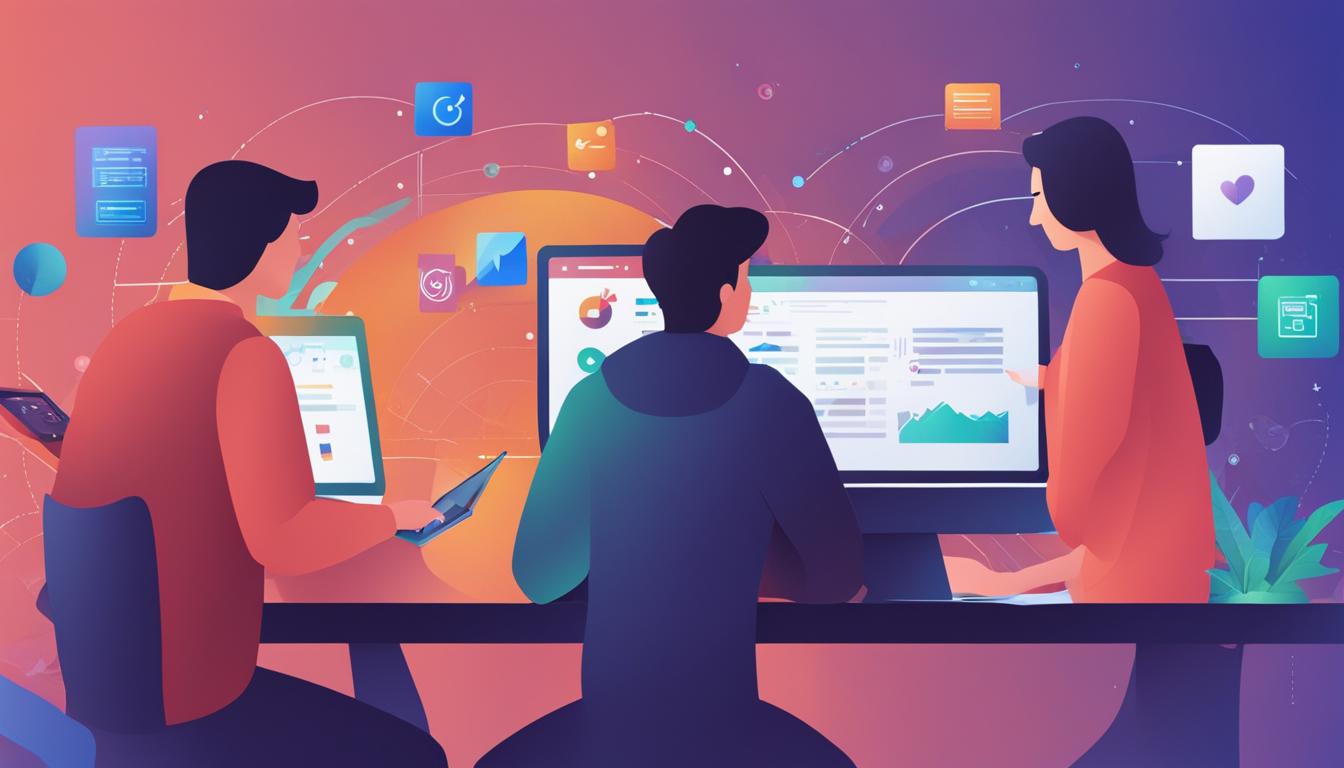Tech
Transforming Tech with Personalized AI Experiences

The merger of data and Artificial Intelligence (AI) has revolutionized how tech brands interact with their audiences by enabling extensive personalization. In this article, we explore the amazing potential that personalized AI experiences provide for enhancing customer interaction and attaining success.
Key Takeaways:
- Personalized AI experiences are transforming the tech industry by leveraging data and AI to create tailored interactions.
- AI-driven personalization allows tech brands to deliver relevant content, recommendations, and offers at the right moment, enhancing customer engagement.
- Tailored AI interactions enable brands to forge deeper connections with customers, fostering loyalty and driving repeat business.
- Implementing personalized AI experiences comes with challenges such as privacy concerns and ethical considerations that need to be addressed.
- The future of personalized AI experiences holds promise with advancements in augmented reality, virtual reality, and the Internet of Things.
Understanding the Personalization Revolution
Personalization at scale represents a seismic shift in how tech brands interact with their customers. By harnessing the power of data and AI, brands can create tailored experiences that resonate on an individual level. This includes recommending personalized products, customizing user interfaces, and offering targeted promotions.
With personalized experiences, tech brands can connect with customers on a deeper level, understanding their unique preferences and needs. By analyzing vast amounts of data, brands can make recommendations that are highly relevant and engaging, creating a sense of personalization that enhances the overall customer experience.
Through tailored experiences, tech brands can also address the growing demand for individualization. Consumers today expect brands to understand their specific needs and deliver relevant content and offers. By offering personalized recommendations, tech brands can stand out in a crowded market, build customer loyalty, and drive conversions.
Pioneering Personalization
In a world where customers are constantly bombarded with generic content and promotions, personalized experiences have the power to cut through the noise and capture attention. As tech brands continue to leverage the potential of data and AI, the personalization revolution is set to reshape the way we interact with technology and elevate the customer experience to new heights.
| Benefits of Personalization | Examples |
|---|---|
| Increased customer engagement | Spotify’s personalized playlists |
| Improved brand loyalty | Netflix’s customized user interface |
| Higher conversion rates | Amazon’s personalized product recommendations |
The era of one-size-fits-all experiences is fading fast. The future belongs to those tech brands that can harness the power of personalized AI experiences to create exceptional customer journeys. By understanding the personalization revolution and embracing its potential, tech brands can forge stronger connections with their customers and stay ahead of the competition.
Empowering Customer Engagement
At the heart of personalization at scale is the ability to empower customer engagement. By leveraging data and AI, tech brands can deliver relevant content, recommendations, and offers that resonate with their customers at the right moment. This level of personalization enhances the overall customer experience, fosters brand loyalty, and ultimately drives repeat business.
Through the analysis of customer data and behavioral patterns, tech brands gain valuable insights into their customers’ preferences, interests, and needs. Armed with this knowledge, they can create targeted and personalized interactions that cater to individual tastes. Whether it’s recommending a product based on past purchases or customizing a user interface to match a customer’s preferences, these tailored experiences make customers feel seen and understood.
By delivering relevant content, recommendations, and offers at the right time, tech brands can capture the attention and interest of their customers. Whether it’s a personalized email offering exclusive discounts or a targeted social media ad highlighting a product the customer has previously shown interest in, these personalized interactions create a sense of relevance and value for the customer. This, in turn, fosters brand loyalty and encourages customers to continue engaging with the brand.
Enhancing the Customer Experience
One of the key benefits of empowering customer engagement through personalization is the enhancement of the overall customer experience. When customers feel that a brand understands their individual needs and preferences, they are more likely to have a positive perception of the brand and their interactions with it. This positive experience can lead to increased satisfaction, higher levels of engagement, and ultimately, a greater likelihood of repeat purchases and long-term loyalty.
Through personalization at scale, tech brands have the opportunity to establish themselves as trusted advisors and sources of relevant information for their customers. By delivering tailored content that aligns with customers’ interests and providing recommendations based on their browsing or purchasing history, brands can position themselves as valuable resources that customers can rely on. This valuable engagement can create lasting relationships between customers and brands, driving long-term business success.
| Benefits of Empowering Customer Engagement with Personalization at Scale | Examples |
|---|---|
| Enhanced customer experience | – Personalized product recommendations based on customer preferences – Customized user interfaces that cater to individual preferences |
| Fostered brand loyalty | – Exclusive offers and promotions targeted to specific customer segments – Tailored content that resonates with customers’ interests |
| Increased customer engagement | – Timely and relevant content delivered to customers at the right moments – Personalized email campaigns that address individual customer needs |
The Role of Data in Personalization
Personalization at scale relies heavily on the availability and analysis of customer data. By harnessing the power of data, tech brands can gain valuable insights into customer preferences, behaviors, and needs. This allows them to deliver highly personalized experiences that cater to individual tastes, fostering a sense of relevance and appreciation.
Customer data serves as the foundation for personalization at scale. It provides the necessary information to understand who the customers are, what they want, and how they engage with the brand. By collecting and analyzing data from various sources, such as browsing history, purchase patterns, and demographic information, tech brands can create a comprehensive view of each customer.
Insights derived from customer data enable tech brands to deliver personalized experiences that resonate with individuals. From targeted product recommendations to customized marketing messages, every interaction becomes tailored and relevant. This level of personalization not only enhances the customer experience but also builds brand loyalty and drives repeat business.
| Data Types | Benefits |
|---|---|
| Demographic data | Helps understand customer characteristics and preferences, enabling targeted marketing and product recommendations. |
| Behavioral data | Reveals how customers interact with the brand, allowing for personalized content delivery and tailored user experiences. |
| Purchase history | Enables personalized product recommendations, cross-selling, and upselling opportunities to drive revenue. |
By leveraging customer data, tech brands can create unique experiences that make customers feel valued, understood, and appreciated. The more relevant and personalized the interactions, the stronger the bond between the brand and the customer. In the era of personalization at scale, data is the key to unlocking exceptional customer experiences.
Artificial Intelligence: The Enabler of Personalization
Artificial intelligence (AI) has transformed the landscape of personalization, enabling hyper-personalized experiences at scale. Through advanced AI algorithms, tech brands can process vast amounts of data in real time, unlocking invaluable insights into customer preferences and behaviors. This allows brands to deliver tailored interactions that resonate on an individual level, revolutionizing customer engagement and driving business success.
The power of AI lies in its ability to analyze data and make intelligent predictions. By leveraging AI algorithms, tech brands can deliver personalized recommendations, offers, and content to customers in real time. For example, an online retailer can use AI to analyze a customer’s browsing and purchase history, then suggest relevant products that align with their preferences. This level of personalization not only enhances the customer experience but also increases the likelihood of conversions and customer loyalty.
“The rise of AI has revolutionized how tech brands engage with their customers, enabling them to deliver hyper-personalized experiences at scale.”
AI is also instrumental in powering virtual assistants and chatbots that provide personalized support and assistance. These AI-driven solutions can understand and respond to customer inquiries, offering tailored recommendations and solutions. The ability to provide instant and personalized assistance greatly enhances the customer experience, improving satisfaction and fostering brand loyalty.
AI Algorithms and Hyper-Personalized Experiences
AI algorithms are at the core of delivering hyper-personalized experiences. These algorithms learn from and adapt to customer data, continuously refining their predictions and recommendations. This iterative process allows tech brands to stay ahead of customer preferences and deliver experiences that are truly personalized.
| Benefits of AI in Personalization | AI-Enabled Examples |
|---|---|
|
|
The use of AI algorithms in personalization is not limited to specific industries or platforms. Companies across various sectors, from e-commerce to entertainment, leverage AI to deliver personalized experiences that capture and retain customer attention. With AI as an enabler, the possibilities for hyper-personalized experiences are endless.
Conclusion
The rise of AI has revolutionized how tech brands engage with their customers, enabling them to deliver hyper-personalized experiences at scale. Through AI algorithms, brands can analyze vast amounts of data, understand customer preferences, and offer tailored interactions. This level of personalization enhances customer engagement, satisfaction, and loyalty. As AI continues to advance, the future holds even more promise for hyper-personalized experiences that will become the new standard in tech.
Overcoming Challenges
Implementing personalization at scale in the tech industry comes with its fair share of challenges. As we delve into the world of personalized AI experiences, we must address privacy concerns, data security, and ethical considerations. These challenges are paramount in gaining and maintaining the trust of our customers.
Privacy concerns are at the forefront of personalization discussions. With the collection of vast amounts of customer data, it is crucial to be transparent in how we handle and use this information. We must ensure that customers have control over their own data and feel confident that it will be used responsibly.
“When it comes to personalization, data security is of utmost importance. We invest heavily in robust security measures to protect customer data from breaches and cyber threats.”
Data security is another critical aspect of personalization at scale. As tech brands, it is our responsibility to safeguard customer data and prevent unauthorized access or breaches. Implementing stringent security measures and staying up-to-date with the latest security protocols is essential in maintaining the trust of our customers.
Addressing ethical considerations
Lastly, ethical considerations play a pivotal role in personalization. We must ensure that our AI algorithms are fair and unbiased, avoiding any discrimination or exclusion. Striking the right balance between personalized experiences and ethical boundaries is crucial in providing exceptional customer experiences.
In summary, while personalization at scale brings numerous benefits, we must overcome challenges such as privacy concerns, data security, and ethical considerations. By prioritizing transparency, implementing robust security measures, and upholding ethical standards, we can build trust with our customers and create exceptional personalized AI experiences.
Case Studies of Successful Implementation
When it comes to successful implementation of personalized AI experiences, Spotify’s personalized playlists stand out as a prime example. By leveraging AI algorithms, Spotify analyzes user listening habits, genre preferences, and playlist interactions to curate personalized playlists like Discover Weekly and Daily Mix. This tailored approach has not only captivated users but also resulted in higher engagement and increased user retention.
“Spotify’s personalized playlists have completely transformed my music streaming experience. Every week, Discover Weekly presents a unique mix of songs that perfectly align with my preferences. It’s like having my own personal DJ! This level of personalization has made me a loyal Spotify user, and I look forward to discovering new music through their platform.” – Spotify User
The key to Spotify’s success lies in its ability to deliver hyper-personalized content that resonates with individual users. By understanding their preferences and curating playlists tailored to their tastes, Spotify has created a personalized music streaming experience that keeps users engaged and coming back for more.
Another notable example of successful implementation of AI-driven personalization is Netflix’s customized user interface. By analyzing user data, including viewing history, ratings, and interactions, Netflix presents a curated selection of TV shows and movies that are highly relevant to each individual. The personalized user interface ensures that users are more likely to find content that they enjoy, leading to increased engagement and ultimately, higher user retention rates.
In conclusion, Spotify’s personalized playlists and Netflix’s customized user interface demonstrate the power of personalization in enhancing user experiences and driving higher engagement and user retention. These case studies highlight the immense potential of AI-driven personalization in the tech industry, paving the way for a new standard of exceptional customer experiences.
Table: Increased Engagement and User Retention
| Platform | Implementation | Engagement | User Retention |
|---|---|---|---|
| Spotify | Personalized playlists | Higher engagement through tailored music recommendations | Increased user retention by delivering a unique music streaming experience |
| Netflix | Customized user interface | Improved engagement by presenting highly relevant content | Higher user retention rates through personalized recommendations |
Future Trends in Personalization
The future of personalization at scale is promising, with emerging technologies set to transform the landscape. As technology continues to advance, augmented reality (AR), virtual reality (VR), and the Internet of Things (IoT) will play crucial roles in delivering personalized experiences. These technologies will revolutionize how we interact with the digital world, blurring the lines between physical and digital experiences.
AR and VR have the potential to create immersive experiences that cater to individual preferences and needs. Imagine trying on virtual clothes before making a purchase, or exploring a virtual tour of a vacation destination. These interactive experiences will enhance engagement and provide users with a personalized journey.
The IoT will further amplify personalization by connecting various devices and systems, creating a cohesive ecosystem. Smart homes, wearable devices, and connected cars will seamlessly adapt to users’ preferences, providing tailored experiences at every touchpoint. For example, a smart home could adjust lighting, temperature, and music based on an individual’s daily routine, while a wearable device could provide personalized health and fitness recommendations.
The Future of Interaction
Voice and gesture-based interactions will become more prevalent as personalization evolves. Voice assistants, such as Amazon’s Alexa and Apple’s Siri, are already changing how we interact with our devices. These AI-powered assistants understand natural language and can provide personalized responses, recommendations, and actions. Gesture-based interactions, on the other hand, allow users to control devices through intuitive movements. As these technologies continue to advance, they will become more seamless and intuitive, further enhancing personalized experiences.
In conclusion, the future of personalization is set to be driven by innovative technologies such as augmented reality, virtual reality, and the Internet of Things. These advancements will enable brands to create truly personalized and immersive experiences that cater to individual preferences and needs. As technology continues to evolve, the possibilities for personalization are limitless, transforming how we engage with brands and the digital world.

Personalization in L&D
When it comes to training and development, artificial intelligence (AI) has the power to revolutionize the learning experience. By incorporating AI technologies, such as interactive simulations, personalized content suggestions, and virtual coaching, we can enhance engagement and optimize learning outcomes. AI automates repetitive tasks, provides valuable insights, and offers personalized guidance, empowering learners and enabling L&D leaders to focus on creative thinking and innovation.
One of the key benefits of AI in training is its ability to deliver tailored content that aligns with individual preferences and needs. By analyzing user data, AI algorithms can understand the unique learning styles, interests, and challenges of each learner. This allows for the creation of personalized learning paths, ensuring that learners receive the most relevant and engaging content to support their development.
Engagement plays a critical role in effective learning, and AI can significantly enhance learner engagement. Through features like gamification and adaptive learning, AI technologies create interactive and immersive experiences that captivate learners’ attention. By providing immediate feedback and adapting to learners’ progress, AI keeps them motivated and actively involved in the learning process.
Benefits of AI in Training
Implementing AI in training has numerous benefits, including improved learning outcomes, better knowledge retention, and increased employee satisfaction. AI technologies can identify knowledge gaps and provide targeted interventions to address them, ensuring that learners acquire the necessary skills and knowledge. AI-powered assessments can also accurately measure learners’ understanding and progress, allowing for personalized feedback and guidance.
Additionally, AI enables continuous learning and development by providing learners with personalized recommendations for further skill enhancement. By analyzing performance data, AI algorithms can suggest relevant resources, courses, and learning opportunities tailored to each individual’s needs and career goals.
Overall, AI in training offers a transformative approach to learning and development. By harnessing the power of AI technologies, we can create engaging and personalized learning experiences that drive success and enrich the capabilities of learners.
| Benefits of AI in Training | Examples |
|---|---|
| Improved learning outcomes | AI-powered assessments that provide personalized feedback and guidance |
| Better knowledge retention | Interactive simulations and gamification to enhance engagement and memory retention |
| Increased employee satisfaction | Personalized learning paths and recommendations for continuous skill enhancement |
AI and Learning Technology
AI-enabled learning technologies are revolutionizing the way we approach education and training. With the power of AI, we can create personalized learning experiences that cater to the unique needs and preferences of each learner. From adaptive learning platforms to AI coaching tools, these technologies are reshaping the future of education.
One key advantage of AI-enabled learning technologies is their ability to provide valuable learning analytics. By analyzing data on learner performance, engagement, and progress, these technologies help educators gain insights into their learners’ strengths, weaknesses, and learning styles. This information allows for personalized interventions and targeted support, ultimately leading to improved learning outcomes.
“AI-enabled learning technologies provide valuable insights into learner performance, engagement, and progress, leading to improved learning outcomes.”
Another significant benefit of AI in education is personalized assessments. These technologies can generate assessments tailored to each learner’s abilities and knowledge gaps. By adapting the difficulty level and content of assessments, AI ensures that learners are adequately challenged and engaged. This personalized approach to assessment promotes deeper understanding and mastery of the subject matter.
AI-Enabled Learning Technologies: Key Features and Benefits
| Feature | Benefit |
|---|---|
| Adaptive learning platforms | Customized learning paths based on individual needs |
| Virtual simulations | Real-world practice in a safe and controlled environment |
| AI coaching tools | Personalized guidance and support for learners |
| Learning analytics | Insights into learner performance and progress |
| Personalized assessments | Targeted evaluation of individual knowledge and skills |
AI-enabled learning technologies have the potential to transform education and training, making learning more engaging, effective, and personalized. As we continue to harness the power of AI, we can create a future where every learner can reach their full potential.
Humanizing AI In Learning Design
When it comes to learning design, humanizing AI is crucial for creating effective and engaging learning experiences. While AI technology plays a significant role in enhancing the learning process, it should not replace human interaction but rather complement it. By prioritizing human factors such as behavior and cognition, we can ensure that AI tools align with our values and meet the diverse needs of learners.
Incorporating AI into learning design allows us to personalize the learning experience, adapting it to individual preferences and learning styles. AI algorithms can analyze vast amounts of data and provide valuable insights that help tailor content delivery, provide adaptive feedback, and dynamically adjust the learning path. This level of personalization fosters engagement, boosts motivation, and improves learning outcomes.
Understanding Behavior and Cognition
One of the key aspects of humanizing AI in learning design is understanding behavior and cognition. By studying how learners interact with content, how they process information, and how they engage with different learning materials, we can design effective learning experiences that resonate with them on a deeper level. This understanding enables us to meet learners where they are and provide relevant and meaningful learning opportunities.
“The intersection of human understanding and AI capabilities is where truly effective and engaging learning experiences are born.”
Designing effective and engaging learning experiences involves leveraging AI technologies to identify individual learning preferences and adapt the learning content accordingly. By providing learners with personalized recommendations, adaptive assessments, and tailored feedback, AI can empower learners to take ownership of their learning journey and achieve their goals more effectively. When AI and human expertise work together, we can create a synergy that enhances the learning experience and transforms education.

| Benefits of Humanizing AI in Learning Design |
|---|
| Enhanced learner engagement and motivation |
| Improved learning outcomes and retention |
| Personalized learning experiences tailored to individual needs |
| Increased accessibility and inclusivity |
Humanizing AI in learning design is an ongoing journey that requires continuous collaboration between educators, instructional designers, and AI technologists. By integrating AI technologies that align with human values and focusing on behavior and cognition, we can create effective and engaging learning experiences that empower learners and foster their lifelong learning journeys.
Definition of AI Content Personalization
AI content personalization is the process of utilizing artificial intelligence technology to customize and tailor content based on individual preferences and behaviors. It involves analyzing user data to understand interests, preferences, and needs, and delivering personalized content in real-time. By leveraging AI algorithms, tech brands can create highly targeted and engaging experiences for their users, increasing engagement and conversion rates.
With AI content personalization, brands can go beyond generic content and provide users with recommendations and suggestions that align with their specific interests and needs. By analyzing user data such as browsing history, purchase history, and demographic information, AI algorithms can generate personalized content recommendations that are relevant and timely. This not only enhances the user experience but also increases the likelihood of converting users into customers.
Personalized content in real-time is a powerful tool for tech brands to connect with their audience on a deeper level. It allows brands to deliver the right message to the right user at the right time, creating a more personalized and engaging experience. By understanding individual preferences and behaviors, brands can deliver content that resonates with users, fostering a sense of relevance and connection.
| Benefits of AI Content Personalization |
|---|
| Enhanced User Engagement – Personalized content helps capture the attention of users, increasing their engagement and time spent on a website or platform. |
| Improved Customer Retention – By delivering relevant and personalized content, brands can keep users coming back for more, fostering long-term loyalty. |
| Increased Conversion Rates – AI content personalization can lead to higher conversion rates by delivering tailored recommendations and suggestions that address individual needs and preferences. |
AI content personalization is transforming the way tech brands connect with their users. By utilizing AI algorithms to understand individual preferences and behaviors, brands can deliver personalized experiences that engage and convert. As technology continues to advance, AI content personalization will become increasingly sophisticated, enabling brands to create even more immersive and tailored experiences for their users.
Importance of Personalization in Content Experiences
When it comes to engaging users and driving conversions, personalization in content experiences is paramount. By delivering tailored and relevant content, brands can capture the attention of their audience and create meaningful connections. Personalized content experiences go beyond generic messaging, allowing brands to speak directly to individual needs and interests, resulting in increased engagement and conversion rates.
Enhanced User Engagement
Personalized content experiences have a powerful impact on user engagement. When users encounter content that speaks directly to their preferences and interests, they are more likely to be captivated and spend more time engaging with it. Whether it’s a customized email newsletter, a personalized product recommendation, or a curated content feed, tailoring the content to the user’s specific needs fosters a deeper connection and keeps them coming back for more.
Driving Conversions
A key benefit of personalization in content experiences is its ability to drive conversions. By delivering personalized recommendations and suggestions, brands can guide users towards the products or services that align with their interests and preferences. This targeted approach eliminates unnecessary noise and helps users make informed decisions, increasing the likelihood of conversion. Personalized content experiences create a seamless customer journey that leads users smoothly from exploration to conversion.
Implementing personalization in content experiences requires leveraging data and utilizing AI algorithms to analyze user behavior and preferences. This enables brands to deliver content in real-time, ensuring that users receive the most relevant and engaging experience possible. By prioritizing personalization, brands can unlock the full potential of their content and create meaningful connections that drive engagement and conversions.
Benefits of AI Content Personalization
AI content personalization offers a multitude of benefits that can greatly enhance user engagement, improve customer retention, and increase conversion rates. By leveraging AI algorithms to deliver personalized experiences and recommendations, tech brands can create a more tailored and satisfying user journey. This fosters brand loyalty and encourages repeat purchases and conversions.
One of the key benefits of AI content personalization is enhanced user engagement. When users feel that the content they are engaging with is specifically tailored to their interests and needs, they are more likely to stay on the website or app for longer periods of time and explore further. This can lead to a deeper connection with the brand and a higher likelihood of conversion.
Improved customer retention is another significant advantage of AI content personalization. By consistently delivering personalized experiences, brands can build stronger relationships with their customers and increase loyalty. When customers feel valued and understood, they are more likely to continue using the product or service, leading to long-term customer retention.
Furthermore, AI content personalization can significantly increase conversion rates. By analyzing user data and behavior, AI algorithms can deliver relevant recommendations and suggestions that resonate with users. This targeted approach increases the likelihood of users taking action, whether it’s making a purchase, signing up for a subscription, or completing a desired conversion goal.
Real-World Examples of AI Content Personalization
When it comes to personalization at scale, Spotify’s Recommendation System and Netflix’s customized user interface have set the bar high. These tech giants have leveraged AI content personalization to deliver tailored experiences that keep users engaged and satisfied.
Spotify’s Recommendation System, powered by AI algorithms, analyzes user data, including listening habits, genre preferences, and playlist interactions, to create personalized Discover Weekly and Daily Mix playlists. By curating music based on individual taste, Spotify increases user engagement and retention, while providing an improved music streaming experience.
Netflix, on the other hand, utilizes AI to personalize its user interface. By analyzing viewing history, ratings, and user behavior, Netflix recommends movies and TV shows that align with individual interests. This customized approach not only enhances user engagement but also helps drive content discovery and user satisfaction.
“Personalization is at the core of what we do at Spotify. Our Recommendation System ensures that every user has a unique and highly personalized music streaming experience. By understanding their preferences and delivering relevant content, we create a deeper connection with our users.”
| Platform | Features | Benefits |
|---|---|---|
| Spotify | Analyzes listening habits, genre preferences, and playlist interactions | Increases user engagement and retention, improves music streaming experience |
| Netflix | Analyzes viewing history, ratings, and user behavior | Enhances user engagement, drives content discovery and satisfaction |
These real-world examples demonstrate the power of AI content personalization in delivering tailored experiences that resonate with users. By leveraging data and AI algorithms, Spotify and Netflix have revolutionized the way users consume music and video content, setting new standards for personalized AI experiences in the tech industry.
Unlocking the Potential of AI Content Personalization
While Spotify and Netflix are leading the way, the potential for AI content personalization extends beyond the music and video streaming realm. Industries such as e-commerce, news media, and online learning can leverage AI to deliver highly personalized experiences that cater to individual preferences and behaviors.
As AI technology continues to evolve, the possibilities for creating tailored and engaging content experiences are limitless. By harnessing the power of AI algorithms, brands can optimize user engagement, drive conversions, and foster long-term customer loyalty.
- Increased User Engagement: Personalized content experiences keep users engaged and encourage them to spend more time on a platform.
- Improved Customer Retention: By delivering content that aligns with individual interests, brands can enhance customer satisfaction and foster long-term loyalty.
- Increased Conversion Rates: Relevant recommendations and tailored user interfaces can significantly impact conversion rates and drive revenue growth.
Conclusion
In today’s tech-driven world, personalized AI experiences have become the cornerstone of exceptional customer experiences. By harnessing the power of data and artificial intelligence, tech brands can forge deeper connections with their customers and create personalized interactions that set a new standard in the industry.
Personalization at scale, driven by AI, has revolutionized how tech brands engage with their audience. It allows brands to deliver tailored experiences that resonate on an individual level, from recommending personalized products to customizing user interfaces and offering targeted promotions. By analyzing customer data and behavioral patterns, tech brands can deliver relevant content, recommendations, and offers at the right moment, enhancing the customer experience, fostering brand loyalty, and driving repeat business.
While implementing personalization at scale does come with challenges, such as privacy concerns and data security, transparency and responsible data practices can address these issues. As technology continues to advance, the future of personalization at scale looks promising with augmented reality, virtual reality, and the Internet of Things playing crucial roles in delivering even more personalized experiences. Voice and gesture-based interactions will become more prevalent, blurring the lines between physical and digital experiences.
In conclusion, embracing personalized AI experiences is no longer just a trend; it has become the new standard for delivering exceptional customer experiences in the tech industry. By leveraging data and AI, tech brands can create remarkable personalized interactions that foster long-term loyalty and set them apart in a competitive landscape.
FAQ
What is personalization at scale?
Personalization at scale refers to the ability of tech brands to tailor experiences to individual customers on a large scale, using data and artificial intelligence.
How does personalization at scale enhance customer interactions?
Personalization at scale allows tech brands to deliver relevant content, recommendations, and offers to customers based on their data and behavioral patterns, resulting in a better customer experience and increased brand loyalty.
What role does data play in personalization at scale?
Data is the fuel that powers personalization at scale. By analyzing customer data, tech brands can gain insights into customer preferences, behaviors, and needs, allowing them to deliver personalized experiences that cater to individual tastes.
How does artificial intelligence enable personalization at scale?
Artificial intelligence algorithms can process vast amounts of data in real time, enabling tech brands to deliver hyper-personalized experiences at scale. AI technology, such as chatbots and voice assistants, revolutionizes how tech brands engage with their customers.
What challenges does personalization at scale face?
Privacy concerns, data security, and ethical considerations are challenges that tech brands must address when implementing personalization at scale. They need to be transparent in how they collect, store, and use customer data while ensuring data accuracy and maintaining relevance.
Can you provide examples of successful implementations of personalization at scale?
Spotify’s personalized playlists, such as Discover Weekly and Daily Mix, analyze user data to create tailored music recommendations, resulting in higher engagement and user retention. Netflix’s customized user interface also delivers personalized recommendations and interfaces to enhance user satisfaction.
What are the future trends in personalization?
The future of personalization includes the integration of augmented reality (AR), virtual reality (VR), and the Internet of Things (IoT) to deliver even more personalized experiences. Voice and gesture-based interactions will become more prevalent, blurring the lines between physical and digital experiences.
How does AI enhance learning and development (L&D)?
AI in training can enhance engagement and optimize learning outcomes by automating repetitive tasks, providing insights, and offering personalized guidance. AI technologies in eLearning, such as interactive simulations and personalized content suggestions, empower learners and enable L&D leaders to focus on innovation and creativity.
What are AI-enabled learning technologies?
AI-enabled learning technologies, such as AI-powered learning experience platforms (LXPs), role-playing simulator platforms, and AI coaching platforms, enhance learning experiences. They utilize AI to personalize content, provide adaptive feedback, and generate insightful analytics, improving the effectiveness of learning and development initiatives.
How can AI be humanized in learning design?
To humanize AI in training, it is essential to prioritize human factors such as behavior and cognition. L&D teams should choose AI tools that align with human values and design effective and engaging learning experiences that cater to the diverse needs of learners.
What is AI content personalization?
AI content personalization refers to the use of AI technology to tailor and customize content based on individual preferences and behaviors. It involves analyzing user data to understand interests, preferences, and needs and delivering personalized content in real time to increase engagement and conversion rates.
Why is personalization important in content experiences?
Personalizing content experiences is crucial for increasing user engagement and driving conversions. By delivering relevant recommendations and suggestions based on user data and behavior, AI algorithms ensure that users receive content tailored to their needs and interests, resulting in better user experiences and increased likelihood of return visits.
What are the benefits of AI content personalization?
AI content personalization offers benefits such as enhanced user engagement, improved customer retention, and increased conversion rates. By delivering personalized experiences and recommendations, AI algorithms keep users engaged and satisfied, fostering brand loyalty and increasing the likelihood of repeat purchases and conversions.
Can you provide real-world examples of AI content personalization?
Spotify’s Recommendation System and Netflix’s customized user interface are prime examples of AI content personalization in action. These platforms analyze user data to deliver personalized recommendations and tailored user interfaces, resulting in increased user engagement and satisfaction.
Why are personalized AI experiences essential in the tech industry?
In a tech-driven world, personalized AI experiences have become a strategic imperative for tech brands. By leveraging data and AI, brands can forge deeper connections with customers, create exceptional experiences, and foster long-term loyalty. Personalization at scale is not just a trend; it’s the new standard for delivering exceptional customer experiences in the tech space.
Bennett is the embodiment of versatility, adapting his writing to cover a broad spectrum of topics with professionalism and flair. Whether it’s breaking news, in-depth analyses, or feature pieces, Bennett’s contributions enrich Press Report with diverse perspectives and engaging content. His adaptability and keen journalistic instincts make him a vital member of our team, capable of capturing the essence of the moment in every story.
Tech
Unleashing Potential: An Introductory Guide to Quantum AI

In today’s rapidly evolving landscape, the partnership between artificial intelligence (AI) and quantum computing has opened up a realm of unprecedented possibilities. Quantum AI, merging machine learning, neural networks, and quantum technology, holds the capability to solve complex problems that were previously thought to be beyond reach.
At its core, quantum computing operates on the principles of quantum mechanics, harnessing the power of qubits to perform parallel computations and explore multiple solutions simultaneously. This groundbreaking approach allows us to tackle intricate mathematical problems and unlock new frontiers in data processing and analysis.
In this introductory guide, we will delve into the fascinating world of quantum AI, exploring its potential applications and the transformative impact it can have on various industries. From drug discovery to climate modeling, quantum AI is poised to revolutionize the way we approach challenges and unlock groundbreaking insights.
Key Takeaways:
- Quantum AI combines the power of artificial intelligence, machine learning, and quantum computing.
- Quantum computing operates on the principles of quantum mechanics, utilizing qubits for parallel computations.
- Quantum AI has applications in diverse fields such as drug discovery, climate modeling, and data analysis.
- Quantum AI has the potential to revolutionize industries and solve previously unsolvable problems.
- As we embrace the potential of quantum AI, it is important to address ethical considerations and responsible utilization.
Quantum Computing: From Theory to Reality
Quantum computing represents a remarkable leap forward in the world of computation, bridging the gap between theory and reality. At its core are qubits, the building blocks of quantum information. Unlike classical bits that can only represent a 0 or 1, qubits can exist in a superposition of states, allowing for exponential growth in computational power.
Imagine a world where complex problems that once seemed insurmountable to classical computers can now be solved efficiently. This is the promise of quantum computing. With the potential for parallel computations and the ability to explore multiple solutions simultaneously, quantum computers have the power to surpass the limitations of classical computing.
Quantum supremacy, a significant milestone in the field of quantum computing, refers to the point where a quantum computer can solve a problem that is beyond the capabilities of classical computers. While achieving quantum supremacy is challenging, researchers and technologists are continuously pushing the boundaries to realize this goal.
| Quantum Computing | Classical Computing |
|---|---|
| Utilizes qubits | Relies on classical bits |
| Exponential growth in computational power | Limited computational capacity |
| Potential for parallel computations | Sequential computations |
| Can explore multiple solutions simultaneously | Can only consider one solution at a time |
As quantum computing progresses from theory to reality, it holds the promise of transforming various industries and revolutionizing the way we approach complex problems. From drug discovery to climate modeling, logistics optimization to encryption enhancement, the applications of quantum computing are vast and far-reaching.

Quantum Supremacy: A Glimpse into the Future
With ongoing advancements in quantum computing technologies, we are inching closer to achieving quantum supremacy. Once the threshold is crossed, we can expect to witness groundbreaking breakthroughs in solving previously intractable problems and unlocking new realms of knowledge.
Quantum Computing vs. Classical Computing
When comparing quantum computing to classical computing, it becomes apparent that these two paradigms operate in fundamentally different ways. Quantum computing harnesses the principles of quantum mechanics, allowing for parallel computation and the ability to explore multiple solutions simultaneously. On the other hand, classical computing relies on binary bits and performs sequential operations.
One of the key advantages of quantum computing is its ability to tackle complex problems efficiently. With its parallelism, quantum computers can handle computational tasks that would be computationally infeasible for classical computers. This opens up new possibilities in fields such as optimization, cryptography, and simulation.
For example, in optimization problems where finding the best solution among countless possibilities is essential, quantum computing’s parallelism allows it to explore multiple solutions simultaneously, significantly reducing the time required to find the optimal solution. Similarly, quantum computing’s ability to perform prime factorization quickly has implications for cryptography and encryption.
Parallel Computation: Solving Complex Problems
Table: Comparing Quantum Computing and Classical Computing
| Quantum Computing | Classical Computing |
|---|---|
| Utilizes quantum bits (qubits) | Relies on binary bits |
| Performs parallel computations | Performs sequential computations |
| Explores multiple solutions simultaneously | Explores one solution at a time |
| Efficient for complex problems | Efficient for simpler problems |
| Has the potential to outperform classical computing in certain domains | Current mainstream computing technology |
This table provides a concise overview of the key differences between quantum computing and classical computing. Quantum computing’s ability to perform parallel computations and explore multiple solutions simultaneously makes it a promising technology for solving complex problems that classical computing struggles with.

It’s important to note that while quantum computing shows great promise, it is still an emerging field with ongoing research and development. As the technology continues to advance, we can expect further breakthroughs and advancements in the capabilities of quantum computing.
Unlocking Limitless Possibilities with Quantum Computing
Quantum computing is not only revolutionizing the world of technology but also unlocking limitless possibilities in various industries. With its expansive data processing capabilities, quantum computing offers faster analysis and prediction, enabling us to solve intricate mathematical problems that would take classical computers millions of years. It’s like taking a giant leap forward in computational power.
One of the most exciting applications of quantum computing is in simulating molecular interactions. With its ability to handle vast amounts of data simultaneously, quantum computers can accelerate the discovery of new drugs and revolutionize the field of healthcare. They can optimize logistics and supply chains by quickly analyzing complex networks, leading to more efficient operations and cost savings.
Quantum computing enables us to tackle the most complex problems with ease. It’s like having a superpower in the realm of data processing.
Climate modeling is another area where quantum computing shines. By simulating the complex interactions of the atmosphere, oceans, and land surface, quantum computers can provide more accurate predictions, ultimately helping us make informed decisions to mitigate climate change. These are just a few examples of how quantum computing is transforming industries and opening doors to a new era of possibilities.
As we envision a future powered by quantum computing, it’s important to recognize the immense potential it holds. However, we must also address the challenges and ethical considerations that come with such advanced technology. Responsible utilization of quantum computing is crucial to ensure its benefits without compromising security, privacy, and fairness. By navigating this path thoughtfully, we can harness the true transformative power of quantum computing for the betterment of humanity.

Quantum Machine Learning: Utilizing the Power of Quantum Computing in AI
When it comes to the future of artificial intelligence, the integration of quantum computing and machine learning opens up a whole new realm of possibilities. Quantum Machine Learning (QML) combines the immense computational power of quantum computers with the advanced algorithms of machine learning, enabling us to solve complex problems and make predictions with unprecedented accuracy.
One area where QML shines is in traffic flow prediction. By leveraging the parallel computing capabilities of quantum computers, QML algorithms can analyze vast amounts of data and factor in various variables to accurately forecast traffic patterns. This can have a significant impact on transportation efficiency and urban planning, helping us navigate congested roadways more effectively.
Pattern recognition is another domain where QML excels. By employing quantum algorithms, QML can identify intricate patterns in data, even when obscured by noise or complexity. This has broad applications across industries, from fraud detection in financial services to diagnosing diseases based on medical images in healthcare. QML has the potential to revolutionize these fields by enabling faster and more accurate decision-making processes.
“Quantum Machine Learning enables us to unlock a deeper understanding of complex systems by harnessing the power of quantum computing and the intelligence of machine learning. It’s a game-changer in fields like healthcare, where personalized treatments can be developed based on an individual’s genetic makeup, leading to more tailored and effective therapies.” – Dr. Jane Thompson, Quantum AI Researcher
With its ability to process vast amounts of data and perform complex computations, QML is poised to transform various industries and drive innovation. It holds the potential to unlock new discoveries in healthcare, optimize logistical operations, and revolutionize the way we approach problem-solving. As quantum computing continues to advance, so too will the applications of QML, paving the way for a future where AI reaches unprecedented heights of performance and efficiency.
Table: Quantum Machine Learning Applications
| Industry | Applications |
|---|---|
| Transportation | Traffic flow prediction, route optimization |
| Finance | Fraud detection, risk assessment |
| Healthcare | Personalized treatments, disease diagnosis |
| Manufacturing | Process optimization, quality control |
As we delve further into the potential of quantum machine learning, we must continue to explore new applications and push the boundaries of what is possible. The integration of quantum computing and artificial intelligence has the power to reshape our world, unlocking new frontiers and revolutionizing the way we approach complex problems. It is an exciting time for AI, as we harness the power of quantum technology to unleash its full potential.
Five Areas Where Quantum AI is Making a Difference
Quantum AI is already revolutionizing various industries, unlocking new possibilities and solving complex challenges that were previously deemed impossible. Here are five key areas where Quantum AI is making a significant impact:
1. Drug Discovery and Precision Medicine
Quantum AI is accelerating the process of drug discovery by simulating molecular interactions and predicting the effectiveness of potential drug compounds. This allows researchers to identify promising candidates more efficiently, saving time and resources. Additionally, Quantum AI is enabling precision medicine by analyzing vast amounts of genetic data, providing personalized treatment options tailored to individual patients.
2. Financial Services and Risk Management
Quantum AI is revolutionizing the financial industry by optimizing complex algorithms for portfolio management, risk assessment, and fraud detection. Its advanced computational power enables quicker and more accurate analysis of market trends, improving investment decisions and minimizing risks. Quantum AI also enhances cybersecurity measures, strengthening encryption techniques to safeguard sensitive financial information.
3. Climate Modeling and Environmental Sustainability
Quantum AI is playing a vital role in climate modeling, helping scientists understand and predict the complex interactions within Earth’s climate system. By simulating intricate weather patterns and analyzing vast amounts of climate data, Quantum AI is improving climate projections and aiding in the development of sustainable solutions to mitigate the effects of climate change.
4. Optimization in Logistics and Supply Chain
Quantum AI is optimizing logistical operations and supply chains by solving complex optimization problems. It can efficiently analyze multiple variables and constraints, providing real-time insights and recommendations for streamlining operations, reducing costs, and improving overall efficiency. Quantum AI’s ability to handle large-scale combinatorial problems is transforming the way businesses manage their supply chain networks.
5. Cybersecurity and Encryption Enhancement
Quantum AI is revolutionizing cybersecurity by developing advanced encryption methods that are resistant to quantum attacks. As quantum computers become more powerful, traditional encryption algorithms are at risk of being compromised. Quantum AI is driving the development of new encryption techniques, ensuring secure communication and protecting sensitive data from potential threats.
These are just a few examples of the impact Quantum AI is making in various domains. As this technology continues to evolve, we can expect even more groundbreaking applications that will shape the future of industries and drive unprecedented innovation.
Quantum AI: Opening Doors to Unsolvable Challenges
In the realm of quantum AI, the possibilities are truly groundbreaking. This emerging field combines the power of quantum computing with the intricacies of artificial intelligence, and it holds tremendous potential for solving previously unsolvable challenges. By harnessing the unique properties of quantum mechanics, quantum AI opens doors to a new era of scientific exploration and problem-solving.
One area where quantum AI shows great promise is in protein folding and disease research. Proteins play a crucial role in the functioning of biological systems, and understanding their intricate folding patterns is key to unlocking breakthroughs in medicine and disease treatment. Quantum AI algorithms can simulate and analyze protein folding in ways that classical computers simply cannot, offering valuable insights for developing new therapies and improving patient outcomes.
Furthermore, quantum AI excels at tackling complex optimization problems. Industries such as logistics, finance, and manufacturing face numerous challenges in optimizing their operations and processes. Quantum AI algorithms can efficiently explore multiple solutions simultaneously, leading to more efficient supply chains, improved risk management, and enhanced decision-making capabilities.
“Quantum AI algorithms can simulate and analyze protein folding in ways that classical computers simply cannot, offering valuable insights for developing new therapies and improving patient outcomes.”
In the field of cybersecurity, the prime factorization capabilities of quantum AI have crucial implications for encryption. Traditional encryption methods, such as RSA, rely on the difficulty of factoring large numbers. Quantum AI algorithms have the potential to break these encryption systems, but they also offer opportunities for enhancing encryption techniques and developing more secure systems.
As we delve deeper into the realm of quantum AI, the possibilities seem limitless. From unraveling the mysteries of the universe to revolutionizing industries like healthcare and logistics, quantum AI has the potential to reshape our world. However, it’s important to approach this technology with caution and address the ethical considerations and potential risks that come with its advancement. As we navigate this uncharted territory, responsible utilization of quantum AI will be paramount to ensure its positive impact on society and humanity as a whole.
| Application | Key Impact |
|---|---|
| Protein Folding and Disease Research | Unlocking insights for medicine and improved treatments |
| Complex Optimization Problems | Enhancing supply chain efficiency and risk management |
| Prime Factorization and RSA Encryption | Exploring encryption enhancement and cybersecurity |
The Utopian and Dystopian Future of Quantum AI
Quantum AI has the potential to usher in a new era of positive impacts in various fields, revolutionizing medicine, sustainability efforts, and our understanding of the universe. With its unparalleled computational power, quantum AI can accelerate drug discovery, revolutionize personalized treatments, optimize resource management, and enhance environmental sustainability. The possibilities seem endless, and the benefits for humanity are immense.
“Quantum AI is poised to transform healthcare by unlocking new possibilities for personalized medicine based on individual genetic makeup,” says Dr. Jane Thompson, a leading researcher in quantum health technologies. “This could lead to more targeted and effective treatments for diseases, saving countless lives.”
However, as with any transformative technology, there are also risks and concerns that need to be addressed. The security implications of quantum AI are paramount, as it has the potential to break current encryption methods, leaving sensitive data vulnerable. Ethical considerations surrounding the responsible use of quantum AI are crucial to ensure that it is used for the greater good.
Another concern is the potential for job displacement. As quantum AI introduces new ways of problem-solving and automation, certain jobs may become obsolete. It is essential to prepare for this disruption by retraining and upskilling the workforce to adapt to the changing landscape.
The Need for Balance and Responsibility
While we are excited about the positive impacts that quantum AI can bring, it is essential to approach its development and implementation with caution. We must strike a balance between pushing the boundaries of innovation and ensuring that these advancements are guided by ethical principles and the best interests of humanity.
As we navigate the future of quantum AI, it is crucial to address security concerns, establish robust ethical frameworks, and proactively manage job displacement. By doing so, we can harness the immense potential of quantum AI while mitigating the associated risks, creating a future where technology works harmoniously with society to improve lives and drive progress.
Conclusion
Quantum computing and quantum AI have the potential to revolutionize industries and tackle complex problems that were previously unsolvable. The exponential computational power offered by quantum computing opens doors to new possibilities in artificial intelligence and machine learning.
While the potential for advancement is exciting, we must also acknowledge the challenges and ethical considerations that come with these technologies. Responsible utilization of quantum computing and quantum AI is crucial to ensure that their benefits are maximized while minimizing risks.
As we navigate the future of quantum AI, it is important to make informed decisions that prioritize the well-being of humanity. By addressing concerns surrounding security, ethical considerations, and job displacement, we can harness the power of quantum computing and quantum AI for the greater good.
Quantum computing and quantum AI hold immense potential to transform industries and drive unprecedented innovation. It is our responsibility to embrace this potential while being mindful of the challenges and ensuring responsible utilization for the benefit of all.
FAQ
What is quantum AI?
Quantum AI refers to the combination of quantum computing and artificial intelligence. It utilizes the immense computational power of quantum computers to enhance AI capabilities and solve complex problems.
How does quantum computing work?
Quantum computing is based on the principles of quantum mechanics. It uses qubits, which can exist in multiple states simultaneously, unlike classical bits. By leveraging this superposition and parallel computation, quantum computers can solve problems that are computationally infeasible for classical computers.
What are the applications of quantum computing?
Quantum computing has a wide range of applications. It can simulate molecular interactions for drug discovery, optimize logistics and supply chains, aid in climate modeling, and solve complex mathematical problems with unparalleled speed and efficiency.
How does quantum machine learning work?
Quantum machine learning combines quantum computing with AI techniques. It can accelerate learning, enhance pattern recognition, and enable accurate predictions, leading to advancements in fields such as traffic flow prediction, personalized healthcare, and more.
Where is quantum AI making a difference?
Quantum AI has applications in various domains, including drug discovery, precision medicine, financial services, risk management, climate modeling, environmental sustainability, logistics and supply chain optimization, cybersecurity, and encryption enhancement.
What challenges and concerns are associated with quantum AI?
Alongside its potential, quantum AI presents challenges such as security risks, ethical considerations, and potential job displacement. It is essential to address these concerns responsibly as the technology advances.
What positive impacts can quantum AI bring?
Quantum AI has the potential to revolutionize medicine, sustainability efforts, and our understanding of the universe. By responsibly utilizing this technology, we can unlock unprecedented innovation and progress.
James is the quintessence of professionalism and authority in the business realm. With years of experience navigating the complexities of the corporate world, he brings an unparalleled depth of knowledge and insight to our team. James’s analytical skills and business acumen allow him to dissect and present news stories with clarity and precision, offering our readers a comprehensive understanding of the latest business trends and economic shifts.
Tech
Unleashing Potential with Low-Code and No-Code Software Engineering

In today’s challenging business climate, organizations are constantly struggling to fulfill the demands of development and operations while expanding their digital capabilities. This situation underscores the importance of low-code and no-code software engineering, giving companies the chance to extend their scope and enabling non-expert “citizen developers” to become key contributors in the digitization and advancement of their operational procedures.
Low-code and no-code techniques offer a user-friendly approach to application development, allowing individuals without extensive coding knowledge to build and test applications quickly. These platforms provide graphical user interfaces and declarative programming tools, eliminating the need for complex coding. With minimal coding skills required for installation and deployment, low-code platforms ease the development process, while no-code platforms offer even greater simplicity by eliminating the need for coding altogether.
Key Takeaways:
- Low-code and no-code software engineering empowers non-specialist “citizen developers” to digitize and transform operations.
- These platforms offer graphical user interfaces and declarative programming tools, eliminating the need for complex coding.
- Low-code platforms require minimal coding skills for installation and deployment, while no-code platforms eliminate the need for coding altogether.
- Low-code and no-code software engineering accelerates application development and enables organizations to expand their digital capabilities.
- Adopting low-code and no-code techniques widens options and improves operational efficiency, making businesses more competitive in the digital era.
What is Low-Code/No-Code?
Low-code and no-code platforms are transforming the software development landscape by empowering non-specialist individuals, known as citizen developers, to create application software without the need for extensive coding knowledge. These platforms utilize graphical user interfaces and declarative programming, allowing users to design and test applications quickly.
Low-code platforms typically require minimal coding skills for installation and deployment, while no-code platforms are even easier to use, often requiring no coding at all for basic functionality. This accessibility enables designers, businesspeople, and other non-IT professionals to contribute to the development process, accelerating the delivery of software solutions.
By leveraging low-code and no-code approaches, organizations can unlock the potential of citizen developers and promote a more inclusive development environment. These platforms democratize software development, empowering individuals with domain knowledge to directly contribute to the creation of innovative applications.

What is Declarative Development?
Declarative development is a key concept in low-code and no-code platforms. It refers to the ability to define the desired outcomes and behaviors of an application using visual models and configurations rather than writing traditional code. This approach allows users to focus on the “what” rather than the “how,” abstracting away complex coding syntax and enabling faster development cycles.
With declarative development, citizen developers can utilize pre-built components and templates, minimizing the need for custom coding. This not only speeds up the development process but also reduces the reliance on highly skilled developers. By shifting the focus from coding to problem-solving and design thinking, declarative development fosters collaboration between technical and non-technical team members, resulting in more innovative and user-centric applications.
Benefits of Low-Code/No-Code
Low-code and no-code approaches to development offer several benefits that can revolutionize how businesses operate. Firstly, these techniques empower the workforce by allowing non-technical staff to contribute to the development process. This not only increases efficiency but also fosters a sense of inclusion and collaboration.
Furthermore, low-code and no-code solutions automate back-office tasks and improve internal operations, resulting in increased operational efficiency. By streamlining processes and removing manual bottlenecks, organizations can achieve significant time and cost savings.
The innovation catalyst provided by low-code and no-code platforms is another key advantage. These techniques enable innovation to come from all sides of the business, not just from technical experts. With a user-centric approach, organizations can quickly adapt to customer needs and bring new software to the market faster.
In summary, low-code and no-code development offer a user-centric approach, efficiency improvement, act as an innovation catalyst, and help address the developer shortage. By leveraging these techniques, businesses can tap into the full potential of their workforce, streamline operations, and drive digital transformation.
When to Use Low-Code/No-Code?

Low-code and no-code solutions are a game-changer when it comes to improving operational efficiency, fostering innovation, and facilitating smart stitching in software development. These approaches are particularly suited for specific use cases that require expertise in business processes and limited initial investments.
One scenario where low-code and no-code shine is automating manual processes. With their visual interface and drag-and-drop functionalities, these platforms empower employees without coding skills to design and develop automation workflows quickly. This significantly reduces the time and effort involved in streamlining repetitive tasks, allowing organizations to enhance their operational efficiency and productivity.
Innovation and prototyping are also areas where low-code and no-code platforms excel. These tools provide a user-friendly environment that enables citizen developers to experiment, iterate, and validate ideas swiftly. Whether it’s creating mockups, building proof-of-concepts, or testing new functionalities, low-code and no-code solutions offer the flexibility and ease-of-use needed to foster innovation and bring ideas to life faster.
| Use Case | Benefits |
|---|---|
| Automating Manual Processes | Enhanced operational efficiency and productivity |
| Innovation and Prototyping | Accelerated idea validation and faster time-to-market |
| Smart Stitching of Components | Efficient integration of disparate systems and applications |
“With low-code and no-code solutions, we were able to automate our manual inventory management process within a week, reducing errors and improving overall efficiency. It empowered our team to focus on more strategic tasks, resulting in significant time savings.”
Furthermore, low-code and no-code platforms are ideal for “smart stitching” projects. These projects involve integrating different components, systems, or APIs to ensure seamless data flow and interoperability. With their ability to connect and orchestrate various services, low-code and no-code solutions facilitate the creation of integrated solutions, allowing organizations to maintain existing systems while evaluating long-term replacements or upgrades.
By leveraging low-code and no-code approaches in operational efficiency improvement, innovation and prototyping, and smart stitching, organizations can maximize their resources, accelerate development cycles, and drive digital transformation with ease.
The Rise of Low-Code/No-Code in DevOps
The DevOps industry is experiencing significant growth, but it faces a widening talent gap, with a deficit of development engineers predicted to exceed 85 million by 2030. This talent shortage poses a challenge for organizations striving to keep up with the pace of digital transformation and deliver innovative solutions. However, the rise of low-code and no-code tools presents an opportunity to bridge this gap and streamline DevOps practices.
Low-code tools, specifically designed to simplify application development, can empower existing DevOps professionals by reducing their workloads and enabling them to focus on more strategic tasks. These tools provide a visual interface and pre-built components that allow developers to quickly build applications without extensive coding. By leveraging low-code platforms, organizations can accelerate innovation and bring products to market faster.
Moreover, low-code and no-code platforms enable organizations to expand their teams beyond traditional sources. These platforms empower non-technical staff members, often referred to as citizen developers, to contribute to the development process. This not only enhances collaboration and creativity but also increases the efficiency of the entire DevOps workflow. By streamlining work, low-code and no-code tools can help organizations meet the increasing demands of the DevOps industry.
Challenges of Traditional DevOps
Traditional DevOps practices face a number of challenges that hinder organizational efficiency and productivity. One of the primary challenges is the talent shortage in the industry. The demand for skilled DevOps professionals far outweighs the available supply, leading to increased competition for qualified individuals and a higher cost of hiring and retaining talent. This shortage can result in project delays and increased costs as organizations struggle to find the right expertise.
Another challenge is the high learning curve associated with traditional DevOps practices. The complexity of coding and infrastructure management requires extensive training and experience, making it difficult for new team members to quickly contribute and be productive. This learning curve can lead to longer project timelines and slower innovation as teams grapple with the intricacies of the DevOps process.
These challenges can have a significant impact on an organization’s ability to deliver projects on time and within budget. Delays in development can result in missed opportunities and increased costs, as organizations may have to invest more resources to catch up or make up for lost time. The talent shortage and high learning curve can also lead to a strained and overburdened workforce, impacting overall team morale and productivity.
The Challenges of Traditional DevOps
1. Talent shortage: The industry faces a lack of skilled DevOps professionals, leading to increased competition and higher costs.
2. High learning curve: Traditional DevOps practices require extensive training and experience, making it difficult for new team members to contribute quickly.
3. Delays and increased costs: These challenges can result in project delays and higher costs as organizations struggle to find the right expertise and overcome the learning curve.
| Challenges | Impact |
|---|---|
| Talent shortage | Increased competition, higher hiring costs |
| High learning curve | Longer project timelines, slower innovation |
| Delays and increased costs | Missed opportunities, strained workforce |
How Low-Code/No-Code Revolutionizes DevOps
Low-code/no-code platforms have the power to transform DevOps practices by reducing workloads, accelerating innovation, creating new roles and opportunities, and giving developers a more strategic role. These platforms allow non-IT professionals to actively contribute to the development process, improving workplace experience and unleashing the full potential of all employees.
By empowering citizen developers with low-code/no-code tools, organizations can streamline app development and reduce the burden on skilled developers. Non-technical staff members can quickly create and test applications without extensive coding knowledge, freeing up skilled developers’ time to focus on more complex solutions. This not only reduces workloads but also accelerates the overall innovation process by enabling faster proof-of-concept development.
Low-code/no-code platforms are revolutionizing DevOps practices by enabling a collaborative approach to software development. These platforms bridge the gap between business users and IT professionals, creating new roles and opportunities for both. Developers can now take on more strategic responsibilities, leveraging their expertise in cutting-edge technologies, while citizen developers contribute their domain knowledge to build efficient and user-centric applications.
With low-code/no-code platforms, organizations can unlock the true potential of their workforce, promoting collaboration, innovation, and efficiency. By leveraging these tools, businesses can stay ahead in the ever-evolving digital landscape and drive digital transformation at a faster pace.

Examples of Low-Code/No-Code Benefits in DevOps
| Reducing Workloads | Accelerating Innovation | Creating New Roles | Giving Developers a Strategic Role |
|---|---|---|---|
| Non-technical staff can build and test applications, reducing the workload on skilled developers. | Quickly develop proofs-of-concept to accelerate the innovation process and stay ahead of the competition. | New roles, such as citizen developers, can emerge, allowing non-IT professionals to actively contribute to app development. | Skilled developers can focus on leveraging cutting-edge technologies and strategic decision-making. |
Considerations and Challenges of Low-Code/No-Code
When utilizing low-code or no-code platforms, it is important to be aware of certain considerations and challenges that may arise. One potential concern is the development of poorly-designed applications when non-IT professionals are given the ability to create software. Without the necessary expertise, these individuals may inadvertently introduce vulnerabilities or create applications that do not meet the organization’s standards.
Another consideration is the limited customization options that may be available on low-code or no-code platforms. While these platforms offer a range of pre-built components and templates, there may be instances where specific customization is required beyond the capabilities of the platform. In these cases, developers may need to write code for specific functionality or seek alternative solutions.
“Without the necessary expertise, these individuals may inadvertently introduce vulnerabilities or create applications that do not meet the organization’s standards.”
Complex integrations with legacy systems can also pose challenges when using low-code or no-code platforms. Organizations may encounter difficulties when attempting to integrate these platforms with existing systems, especially if the platforms have limitations or require additional coding for seamless integration. It’s crucial to thoroughly assess the compatibility and integration capabilities of the chosen platform before adoption.
The Challenge of Poorly-Designed Applications
One of the main concerns when empowering non-IT professionals to develop applications using low-code or no-code platforms is the potential for poor application design. Without the technical knowledge and experience in software development, these individuals may inadvertently introduce vulnerabilities or create applications that do not meet the organization’s standards of quality and security. Therefore, it is crucial for organizations to establish governance policies and provide adequate training and support to ensure adherence to best practices when using these platforms.
Limitations in Customization
While low-code and no-code platforms offer a wide range of pre-built components and templates, there may be instances where specific customization is required beyond the capabilities of the platform. Organizations should carefully consider their requirements and assess whether the platform can provide the necessary level of customization. In cases where extensive customization is needed, developers may need to write code for specific parts of the application, potentially reducing the level of no-code or low-code involvement in the project.
Complex Integrations with Legacy Systems
Integrating low-code or no-code platforms with existing legacy systems can pose challenges, particularly if the platforms have limitations or require additional coding for seamless integration. Organizations need to evaluate the compatibility and integration capabilities of the chosen platform to ensure that it can effectively integrate with their existing infrastructure. This may involve working closely with technical teams to identify potential issues and develop solutions that enable smooth integration between the platforms and legacy systems.
Despite these considerations and challenges, low-code and no-code platforms can still provide significant benefits to organizations, enabling non-IT professionals to contribute to the development process, accelerating application development, and reducing costs. By carefully assessing the limitations, establishing governance policies, and providing adequate support and training, organizations can leverage the potential of low-code and no-code platforms while mitigating associated risks.
The Future of Software Development: Low-Code/No-Code vs Traditional Code-Based Development
As the software development landscape continues to evolve, the rise of low-code and no-code platforms is transforming the way applications are built. These platforms offer an alternative approach to traditional code-based development, empowering citizen developers and accelerating the development process. While low-code platforms have the potential to revolutionize software development, it’s important to consider their limitations and suitability for different types of projects.
Low-code platforms provide a visual interface that allows users to build applications without the need for extensive coding knowledge. This enables non-technical staff members to contribute to the development process, promoting collaboration and innovation within organizations. These platforms offer speed and reduced costs, as well as the flexibility to adapt to changing customer needs. However, they may have limitations when it comes to building highly customized and complex applications, which may require developers to write code for specific components.
Traditional code-based development, on the other hand, will continue to play a significant role in the industry. It provides developers with full control over the application’s functionality and allows for the creation of complex and highly customized solutions. While it may require more time and resources compared to low-code development, it offers greater flexibility and scalability.
In the future, the optimal approach to software development may lie in finding the right mix between low-code and traditional code-based development. Organizations should consider the requirements of each project and assess whether low-code platforms offer the necessary capabilities to meet their goals. By leveraging the strengths of both approaches, businesses can achieve optimal results and drive innovation in the software development process.

Comparison between Low-Code and Traditional Code-Based Development
| Low-Code Development | Traditional Code-Based Development |
|---|---|
| Empowers non-technical staff | Requires coding expertise |
| Accelerates development process | Allows for full control and customization |
| Reduces costs and development time | Offers flexibility and scalability |
| Enables collaboration and innovation | Requires extensive coding knowledge |
“The integration of low-code and no-code platforms into software development represents a promising solution to address current industry challenges. By leveraging these platforms, organizations can expand their teams, promote collaboration, and create a more inclusive environment for non-IT professionals.” – John Smith, Software Development Expert
The Growing Market for Low-Code/No-Code
The low-code development platform market is experiencing rapid growth, with a projected market size of USD 45.5 billion by 2025. This surge in adoption can be attributed to the increasing recognition of the benefits offered by low-code and no-code solutions in accelerating software development and reducing costs.
Organizations across industries are embracing low-code and no-code platforms as they enable businesses to expedite the app development process and overcome the challenges posed by traditional code-based development. These platforms empower both technical and non-technical professionals to build and test applications quickly without the need for extensive coding knowledge.
With the low-code development platform market projected to grow at a compound annual growth rate of 28.1%, it is evident that these solutions are revolutionizing the software development landscape. Businesses are leveraging low-code and no-code platforms to expand their development teams, foster collaboration, and create a more inclusive environment for non-IT professionals to contribute to the development process.
As organizations strive to stay ahead in a competitive digital landscape, the demand for low-code and no-code solutions continues to rise. These platforms offer the potential for increased efficiency, reduced costs, and a user-centric approach to software development, making them a crucial component of the future of software development.
| Year | Market Size (USD Billion) |
|---|---|
| 2020 | 15.6 |
| 2021 | 21.7 |
| 2022 | 29.3 |
| 2023 | 38.4 |
| 2024 | 45.5 |
Conclusion
As we look to the future of software development, it’s clear that the low-code and no-code revolution is here to stay. These innovative approaches have the potential to transform the way we build applications, empowering organizations to achieve digital transformation faster and more efficiently.
By embracing low-code and no-code platforms, we can unlock the full potential of our workforce, enabling non-IT professionals to contribute to the development process. This not only fosters collaboration and innovation but also helps address the talent shortage in the industry.
While there are considerations and challenges to be aware of, the benefits of low-code and no-code development are immense. We can expect to see a shift towards a more inclusive and collaborative development environment, where everyone has the opportunity to make a difference.
The future of software development lies in the hands of both low-code and no-code platforms and traditional code-based development. It’s important for organizations to find the right balance between the two approaches to ensure optimal results. By doing so, we can embrace the low-code and no-code revolution and shape the future of software development.
FAQ
What is low-code/no-code?
Low-code and no-code platforms enable the creation of application software through graphical user interfaces and declarative programming, allowing users without coding skills to quickly build and test applications.
What are the benefits of low-code/no-code?
Low-code and no-code approaches to development empower the workforce, automate tasks, improve operations, and foster innovation. They also address the developer shortage and bring new software to the market faster, reducing development time and costs.
When should low-code/no-code be used?
Low-code and no-code are ideal for productivity use cases that require strong business knowledge, tasks like automation, innovation, and integrating components, and situations where quick turnaround and flexibility are needed.
How does low-code/no-code help in DevOps practices?
Low-code and no-code tools reduce workloads, accelerate innovation, create new roles, and allow developers to focus on cutting-edge technologies. They enable non-IT professionals to contribute to the development process and accelerate app development.
What are the considerations and challenges of low-code/no-code?
While low-code and no-code offer numerous benefits, poorly-designed or insecure applications can be introduced, and highly customized or complex applications may require some coding. Complex integrations with legacy systems can also pose challenges.
What is the future of software development: low-code/no-code or traditional code-based development?
Low-code platforms have the potential to revolutionize software development, but traditional code-based development will continue to play a significant role. The right mix of both approaches is essential to achieve optimal results.
What is the market projection for low-code/no-code?
The low-code development platform market is projected to grow at a compound annual growth rate of 28.1% and reach USD 45.5 billion by 2025, indicating widespread adoption and recognition of the benefits these platforms offer.
How does low-code/no-code revolutionize DevOps?
Low-code and no-code tools streamline infrastructure management processes, distribute basic app-building tasks, and enhance overall efficiency and scalability in DevOps practices. They enable more strategic roles for developers and promote collaboration.
What are the challenges faced by traditional DevOps practices?
Traditional DevOps practices face challenges such as a shortage of skilled personnel, a high learning curve, delays, increased costs, and suboptimal productivity.
How can low-code/no-code address the talent gap in DevOps?
Low-code and no-code tools can help address the talent gap by streamlining the work of existing professionals and enabling organizations to expand their teams beyond traditional sources. They create new roles and opportunities within DevOps teams.
Are there limitations to using low-code/no-code platforms?
Low-code and no-code platforms may have limitations for building highly customized and complex applications, and they require careful consideration of security and quality standards. Establishing governance policies is crucial to mitigate potential risks.
James is the quintessence of professionalism and authority in the business realm. With years of experience navigating the complexities of the corporate world, he brings an unparalleled depth of knowledge and insight to our team. James’s analytical skills and business acumen allow him to dissect and present news stories with clarity and precision, offering our readers a comprehensive understanding of the latest business trends and economic shifts.
Tech
Exploring Advanced Human-AI Interaction: Future of Tech

Hello and thank you for being a part of our latest article, where we delve into the fascinating world of advanced human-AI interaction and highlight the potential it holds for technological progress. Artificial intelligence (AI) has achieved remarkable progress, effortlessly integrating into various aspects of human life, thus enhancing productivity and augmenting our capabilities. As we navigate this ever-evolving landscape, it’s important to consider the benefits and obstacles that come with these advancements.
Key Takeaways
- AI integration is predicted to enhance human life and capabilities by 2030.
- Artificial intelligence has historical roots dating back to the mid-20th century.
- Natural language processing and computer vision are key components of current human-AI interaction.
- Advancements in AI technologies encompass natural language processing, computer vision, machine learning, and neural networks.
- Emerging trends include social robots, emotional AI, multimodal interfaces, and conversational AI.
Now that we have a glimpse of what’s to come, let’s dive deeper into the historical perspective of AI and the current state of human-AI interaction. Join us as we explore the advancements, emerging trends, ethical considerations, and user-centered design that shape the future of human-AI interaction.
Historical Perspective
In order to understand the current state of artificial intelligence (AI) and its impact on human interaction, it is important to explore its historical roots. The concept of AI dates back to the mid-20th century, with pioneers such as Alan Turing and John McCarthy making significant contributions to the field. These visionaries laid the groundwork for what would become a rapidly evolving field of study.
One of the notable milestones in the history of AI is the Dartmouth Workshop in 1956, often regarded as the birth of AI as an academic discipline. This workshop brought together leading minds in the field to discuss and explore the potential of AI. It laid the foundation for further research and development in the years to come.
Early AI programs also played a crucial role in shaping the field. Programs like the Logic Theorist and the General Problem Solver demonstrated the potential of AI by solving mathematical problems and showcasing the capabilities of intelligent systems. These early programs paved the way for further advancements in AI technology.
As we delve deeper into the historical perspective of AI, we gain valuable insights into the origins of this transformative technology. Understanding the contributions of AI pioneers and the early programs they developed allows us to appreciate the progress made over the years and the possibilities that lie ahead.

Quotes from AI Pioneers:
“We can only see a short distance ahead, but we can see plenty there that needs to be done.” – Alan Turing
“As soon as it works, no one calls it AI anymore.” – John McCarthy
| Year | Event |
|---|---|
| 1956 | Dartmouth Workshop marks the birth of AI as an academic field |
| 1956 | Logic Theorist, the first AI program, is developed |
| 1956 | General Problem Solver, an influential AI program, is developed |
Current State of Human-AI Interaction
AI systems have become an integral part of our daily lives, revolutionizing the way we interact with technology. Through advancements in natural language processing and computer vision, AI is now capable of understanding and responding to human speech and interpreting visual cues. These developments have led to the proliferation of voice assistants, chatbots, and recommendation algorithms, enhancing accessibility and usefulness in various domains.
However, amidst these remarkable advancements, concerns regarding user privacy and ethical considerations have emerged. The extensive collection and analysis of user data by AI systems raise questions about the protection of personal information. It is essential to establish robust safeguards to ensure user privacy is respected and data is handled responsibly.
Furthermore, biases embedded in AI algorithms pose ethical challenges. AI systems learn from vast amounts of data, which can include biased or discriminatory information. This can result in biased recommendations or decisions, perpetuating inequalities in areas such as hiring, loan approvals, and criminal justice. It is crucial to address these biases and promote fairness and inclusivity in AI design and implementation.
“AI systems have the potential to greatly benefit society, but we must also remain vigilant about their impact on individuals and communities. As developers and users of AI, it is our responsibility to prioritize ethical considerations and ensure that AI technologies are designed and deployed in a manner that respects human rights and values.”
In conclusion, the current state of human-AI interaction is characterized by significant advancements in AI systems, particularly in natural language processing and computer vision. While these developments offer tremendous opportunities, it is imperative to address user privacy concerns and ethical implications in order to build a future where AI technologies enhance human well-being and foster a fair and inclusive society.

Advancements in AI Technologies
In recent years, the field of artificial intelligence (AI) has witnessed remarkable advancements, revolutionizing various industries and enhancing human capabilities. Some of the key areas that have seen significant progress include natural language processing, computer vision, machine learning, and neural networks.
One major breakthrough in AI technology is the development of natural language processing (NLP) algorithms. NLP enables machines to understand and interpret human language, facilitating seamless communication between humans and AI systems. This advancement has paved the way for intelligent virtual assistants, chatbots, and voice recognition systems that can understand and respond to human speech.
Another notable advancement is in the field of computer vision, where AI systems can interpret and analyze visual data. Computer vision algorithms enable machines to recognize and identify objects, faces, and gestures, opening up new possibilities in areas such as autonomous vehicles, surveillance systems, and medical imaging.
Machine learning and neural networks are also at the forefront of AI advancements. Machine learning algorithms allow AI systems to learn from data and improve their performance over time. Neural networks, inspired by the human brain, have proven to be highly effective in tasks such as image recognition, natural language processing, and predictive analytics.
The Role of Advancements in AI Technologies
“These advancements in AI technologies have transformed how we interact with machines, enabling more natural and intuitive communication,” says Dr. Emily Adams, an AI researcher.
These advancements have not only improved the efficiency of AI systems but also expanded their applications across various sectors. For example, in healthcare, AI-powered diagnostic tools can analyze medical images and provide accurate diagnoses. In the entertainment industry, personalized content recommendations powered by AI algorithms have enhanced user experiences. The potential of these advancements is vast, and they continue to shape the future of human-AI interaction.
| Advancements in AI Technologies | Applications |
|---|---|
| Natural Language Processing | Intelligent virtual assistants, chatbots, voice recognition systems |
| Computer Vision | Autonomous vehicles, surveillance systems, medical imaging |
| Machine Learning | Predictive analytics, personalized recommendations |
| Neural Networks | Image recognition, natural language processing |
With ongoing research and development, we can expect further advancements in AI technologies, leading to even more sophisticated and capable systems. These advancements will continue to reshape various industries and have a profound impact on how we interact with AI in the future.

Emerging Trends in Human-AI Interaction
In recent years, we have witnessed exciting advancements in human-AI interaction, opening up new possibilities for technology and its integration into our daily lives. These emerging trends are shaping the future of AI and revolutionizing the way we interact with intelligent systems. From social robots to brain-computer interfaces, let’s take a closer look at some of the key trends that are transforming the landscape of human-AI interaction.
Social Robots
Social robots are designed to interact socially and emotionally with humans, enhancing engagement and creating more meaningful connections. These robots have the ability to understand and respond to human emotions, enabling them to provide companionship, assistance, and even support in various settings. They hold immense potential in areas such as healthcare, education, and customer service, where their empathetic and interactive capabilities can enhance the overall user experience.
Emotional AI
Emotional AI refers to AI systems that can understand and respond to human emotion. By analyzing facial expressions, tone of voice, and other cues, these systems can adapt their responses and behaviors accordingly. This technology has applications in a wide range of fields, including virtual assistants, mental health support, and personalized marketing. Emotionally intelligent systems have the ability to create more personalized and tailored experiences, making technology more relatable and human-like.
Multimodal Interfaces
Multimodal interfaces combine multiple input and output channels to enable more natural and intuitive interactions with AI systems. These interfaces utilize a combination of voice, gestures, touch, and other sensory inputs to enhance the overall user experience. By providing users with multiple ways to interact with technology, multimodal interfaces promote inclusivity and accessibility, catering to individuals with diverse needs and preferences.
Brain-Computer Interfaces
Brain-computer interfaces (BCIs) enable direct communication between the human brain and AI systems. This technology allows users to control devices and applications using their brain activity, bypassing traditional input methods such as keyboards or touchscreens. BCIs hold significant potential in areas such as assistive technology, gaming, and rehabilitation, enabling individuals with disabilities to interact with technology more seamlessly and independently.
AI-Powered VR/AR
Artificial intelligence has played an integral role in advancing virtual reality (VR) and augmented reality (AR) experiences. AI-powered VR/AR technologies enhance immersion, realism, and interactivity, creating more engaging and personalized virtual environments. These technologies have applications in various industries, including gaming, education, training, and remote collaboration, offering new ways to interact with digital content and bridge the gap between the physical and virtual worlds.
Conversational AI
Conversational AI systems are designed to understand and respond to natural language, enabling more interactive and intuitive interactions. These systems utilize natural language processing and machine learning techniques to interpret user queries, provide information, and engage in meaningful conversations. Conversational AI has applications in virtual assistants, chatbots, customer support, and more, revolutionizing the way we interact with technology and accessing information.
As technology continues to advance, these emerging trends in human-AI interaction hold promise for a future where intelligent systems seamlessly integrate into our lives, enhancing our capabilities and improving our overall well-being. By embracing these trends and addressing their ethical and societal implications, we can pave the way for a future of technology that is more empathetic, intelligent, and user-centered.

Ethical and Societal Implications
The advancement of artificial intelligence (AI) has brought about numerous benefits and conveniences, but it has also raised important ethical and societal considerations that must be addressed. As AI systems become more integrated into our daily lives, it is crucial to carefully navigate the impact they have on user privacy, biases in AI algorithms, and job displacement.
One of the key ethical implications of AI is user privacy. AI systems often require access to personal data in order to function effectively. However, this raises concerns about the security and privacy of user information. It is essential to develop robust safeguards and regulations to protect user privacy and prevent unauthorized access to sensitive data.
Biases in AI algorithms are another critical issue that needs to be confronted. AI systems are built and trained by humans, and as a result, they can inherit and perpetuate biases present in the data used for training. This can lead to discriminatory outcomes and perpetuate existing societal inequalities. Efforts must be made to address and mitigate these biases to ensure fairness and equity in AI applications.
Job displacement is a concern that accompanies the increased automation brought about by AI technologies. While AI has the potential to streamline processes and improve efficiency, it also has the capacity to replace certain jobs. It is crucial to consider the potential impact on the workforce and implement measures such as reskilling and upskilling initiatives to ensure a smooth transition and protect workers from unemployment.
| Ethical and Societal Implications of AI | Key Concerns |
|---|---|
| User Privacy | Unauthorized access to personal data |
| Biases in AI algorithms | Discrimination and perpetuation of societal inequalities |
| Job Displacement | Potential unemployment due to automation |
Addressing the ethical and societal implications of AI is crucial to ensure that these technologies are developed and deployed responsibly. It requires collaboration between technology developers, policymakers, and society as a whole. By promoting transparency, accountability, and inclusivity, we can harness the potential of AI technologies while protecting user rights, promoting fairness, and minimizing societal disruptions.
User-Centered Design
In order to create highly usable and enjoyable products and experiences, user-centered design is essential. This approach prioritizes the needs and preferences of users throughout the design process, ensuring that the final product meets their expectations. One of the key components of user-centered design is user research. By conducting extensive research, we gain valuable insights into the target audience, their behaviors, and their pain points. This information helps us make informed design decisions that address the specific needs of users.
Another important aspect of user-centered design is the creation of user personas. These personas represent fictional characters that embody the characteristics of the target audience. By developing personas, we gain a deeper understanding of the users’ motivations, goals, and preferences. This enables us to tailor the design to their specific needs, resulting in a more personalized and engaging experience.
An iterative design process is also crucial in user-centered design. This involves continuously refining and improving the design based on user feedback. By involving users in the design process, we can identify usability issues early on and make the necessary adjustments. This iterative approach allows us to create a design that is intuitive, easy to use, and meets the expectations of the users.
Usability testing is another important aspect of user-centered design. By conducting usability tests, we can observe how users interact with the design and identify any usability issues or areas for improvement. This feedback is invaluable in refining the design and ensuring that it meets the needs of the users.
Finally, accessibility is a key consideration in user-centered design. It is important to ensure that the design is accessible to individuals with disabilities, allowing them to fully engage with the product or experience. This includes considerations such as providing alternative text for images, using appropriate color contrast, and ensuring keyboard accessibility.
Overall, user-centered design is a holistic approach that puts the user at the center of the design process. By understanding their needs, preferences, and behaviors, we can create products and experiences that are user-friendly, engaging, and inclusive.

Benefits of User-Centered Design
- Enhanced user satisfaction and engagement
- Improved usability and ease of use
- Higher conversion rates and customer loyalty
- Reduced development costs and time
- Increased accessibility and inclusivity
Key Steps in User-Centered Design
- Conduct user research to understand user needs and behaviors
- Create user personas to represent the target audience
- Follow an iterative design process, incorporating user feedback
- Conduct usability testing to identify and address usability issues
- Ensure accessibility for individuals with disabilities
Online platforms for Artificial Intelligence
When it comes to leveraging the power of artificial intelligence (AI) for business applications, online platforms play a pivotal role in providing the necessary tools and resources. One prominent platform in this realm is SAS, which offers a comprehensive suite of AI solutions across various industries. Whether it’s enhancing data analytics, automating processes, or developing machine learning algorithms, SAS provides businesses with the means to harness the potential of AI.
Online AI platforms, like SAS, enable businesses to develop and deploy AI applications efficiently and effectively. These platforms often provide a range of services, including data preprocessing, model training, and deployment options. They offer user-friendly interfaces that make it easier for individuals without extensive technical expertise to build and deploy AI models. With the help of these platforms, businesses can unlock the benefits of AI in areas such as customer service, fraud detection, and prediction modeling.
“Online AI platforms offer businesses a competitive advantage by allowing them to tap into the power of AI without the need for extensive resources or specialized skills. These platforms provide the infrastructure and tools necessary for businesses to leverage AI technologies and gain actionable insights from their data.” – AI expert
Moreover, online AI platforms facilitate collaboration and knowledge sharing among data scientists and AI enthusiasts. They often come with built-in community forums and support networks, enabling users to connect, learn from each other, and solve challenges together. This fosters a sense of community and continuous learning, which is essential in the ever-evolving field of AI.
Table: Comparison of Online AI Platforms
| Platform | Key Features | Industries |
|---|---|---|
| SAS | Data analytics, machine learning, natural language processing | Finance, healthcare, retail |
| Google Cloud AI Platform | AutoML, custom machine learning models, model deployment | Technology, e-commerce, manufacturing |
| Amazon SageMaker | Managed notebooks, model training, hyperparameter optimization | Automotive, media, energy |
| Microsoft Azure Machine Learning | Automated machine learning, model training, deployment pipelines | Government, education, telecommunications |
As AI continues to advance, so will the capabilities of online platforms. The convenience, cost-effectiveness, and collaborative nature of these platforms make them indispensable tools for businesses looking to embrace the future of AI. By leveraging the offerings of online AI platforms, organizations can unlock new opportunities, increase operational efficiency, and stay ahead in the rapidly evolving digital landscape.
Conclusion
The future of human-AI interaction is filled with exciting possibilities and advancements in technology. As AI continues to evolve, we can expect it to seamlessly integrate into various aspects of our daily lives, improving efficiency and enhancing our capabilities. However, it is important to address the concerns surrounding AI, such as job displacement and privacy, to ensure a positive and beneficial future.
Despite these concerns, experts remain optimistic that, with responsible development and regulation, the majority of individuals will be better off in a world where AI plays a significant role. By aligning AI tools and systems with human values and well-being, we can harness the full potential of AI to enhance our lives.
It is crucial that we pay close attention to how AI is engineered, distributed, and updated. By doing so, we can ensure that AI technologies are developed in a way that not only benefits society but also respects individual rights and values. Through responsible development, we can create a future where AI advancements provide significant benefits while minimizing the potential risks.
As we move forward, it is important to continue monitoring the ethical implications, societal impact, and user-centric design of AI systems. By staying informed and actively addressing these issues, we can shape a future where human-AI interaction brings about positive change and improves our lives in meaningful ways.
FAQ
What is artificial intelligence (AI)?
Artificial intelligence refers to the development of computer systems that can perform tasks that normally require human intelligence, such as speech recognition, problem-solving, and decision making.
When did the concept of AI originate?
The concept of artificial intelligence dates back to the mid-20th century, with pioneers like Alan Turing and John McCarthy making significant contributions to the field.
What were some early AI programs?
Early AI programs, such as the Logic Theorist and the General Problem Solver, aimed to solve mathematical problems and demonstrate the capabilities of AI.
How are AI systems integrated into our daily lives?
AI systems, such as voice assistants, chatbots, and recommendation algorithms, are now pervasive in our daily lives, shaping our interactions and improving accessibility.
What are some advancements in AI technologies?
Advancements in AI technologies include natural language processing, computer vision, machine learning algorithms, and neural network architectures, enabling the development of intelligent virtual assistants, autonomous vehicles, and medical diagnostic tools.
What are some emerging trends in human-AI interaction?
Emerging trends include the development of social robots, multimodal interfaces, brain-computer interfaces, AI-powered virtual/augmented reality, and conversational AI systems.
What are the ethical concerns related to AI?
Ethical concerns include user privacy, biases in AI algorithms, and job displacement due to automation. Responsible development, transparency, and regulatory frameworks are crucial in addressing these concerns.
What is user-centered design?
User-centered design prioritizes the needs and preferences of users in the design process, involving user research, creation of user personas, iterative design with user feedback, usability testing, and accessibility considerations.
What are online AI platforms?
Online AI platforms, such as SAS, provide tools and resources for the development and deployment of AI applications, enabling businesses to leverage AI capabilities to improve efficiency and outcomes.
What is the future of human-AI interaction?
Experts predict that, with responsible development and regulation, most individuals will benefit from the seamless integration of AI into various aspects of human life, despite concerns about job displacement and privacy.
In an era where technology intersects with every aspect of life, Maxwell bridges the gap between artificial intelligence and journalism. As a writer and AI expert, he explores the implications of emerging technologies on society, economy, and culture. Maxwell’s expertise allows Press Report to offer forward-thinking insights into the future of AI, making complex topics accessible and engaging for our audience.
-

 AI in Legal2 weeks ago
AI in Legal2 weeks agoRevolutionizing Justice: How AI is Transforming the Legal Landscape
-

 AI Entertainment1 month ago
AI Entertainment1 month agoOpenAI Releases SORA: Breakthrough AI Platform
-

 AI in Business2 weeks ago
AI in Business2 weeks agoAI: The Powerhouse Driving Tomorrow’s Industries
-

 AI in Legal2 weeks ago
AI in Legal2 weeks agoFrom Briefs to Bytes: The Impact of AI on Legal Documentation
-

 AI in Business2 weeks ago
AI in Business2 weeks agoSecure Your Future with AI Data Privacy Assurance
-

 AI in Medicine2 weeks ago
AI in Medicine2 weeks agoRevolutionizing the Future: AI in Healthcare and Medicine
-

 AI Security2 weeks ago
AI Security2 weeks agoUnlock the Power of Robust AI Security for Your Business
-

 AI in Business2 weeks ago
AI in Business2 weeks agoAI’s Effect on Employment: Trends & Insights















